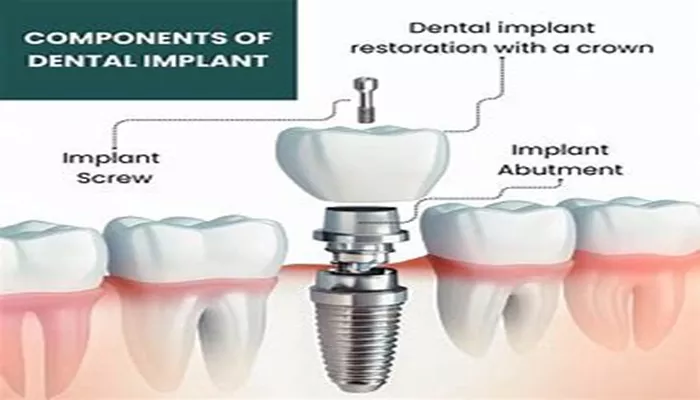Dental implants are a popular and effective solution for replacing missing teeth. They provide a strong foundation for fixed or removable replacement teeth that are made to match natural teeth. One common question about dental implants is whether they all have screws. This article will explore the different types of dental implants, their components, and whether screws are always involved in the process.
Understanding Dental Implants
A dental implant is a small post, usually made of titanium, that is surgically placed into the jawbone where teeth are missing. The metal post acts as a root for the artificial tooth. Over time, the bone grows around the implant, holding it firmly in place. This process, called osseointegration, provides a stable and long-lasting support for replacement teeth.
Dental implants are composed of three main parts:
The Implant: This is the screw-like device that is placed into the jawbone. It acts as a root for the artificial tooth.
The Abutment: This is a connector that is placed on top of the implant. It holds and supports the crown (the artificial tooth).
The Crown: This is the visible part of the tooth that is attached to the abutment. It is usually made of porcelain or ceramic and is designed to look like a natural tooth.
See also: What Does General Care of A Dental Implant Consist of?
Do All Dental Implants Have Screws?
The term “screw” in the context of dental implants can be a bit confusing because it can refer to different parts of the implant. The actual implant that is placed into the jawbone often has a screw-like shape, but not all implants use screws in the same way.
Traditional Dental Implants
Most traditional dental implants do have a screw-like design. The implant itself resembles a small screw, which is inserted into the jawbone. This design allows for easy placement and secure anchoring in the bone. The screw shape also helps in the osseointegration process, as it provides more surface area for the bone to attach to.
Mini Dental Implants
Mini dental implants are another type of implant that is smaller in diameter than traditional implants. They also have a screw-like design but are thinner. Mini implants are often used for smaller teeth or when there is not enough bone density for a traditional implant. They are less invasive to place and can be a good option for patients with limited bone structure.
Plate-Form Implants
Plate-form implants are another type of dental implant that does not have a traditional screw shape. Instead, they are flat and long, resembling a small metal plate. These implants are used in areas where the jawbone is too narrow for a traditional implant. The plate-form implant is inserted into the bone and held in place by screws that secure it to the jawbone. While the implant itself is not screw-shaped, screws are still used in the placement process.
Alternatives to Screw-Retained Implants
While screws are commonly used in dental implants, they are not the only option. Some dental implants use a different mechanism to secure the crown to the abutment and the implant.
Cement-Retained Implants
Cement-retained implants use a special dental cement to attach the crown to the abutment. In this type of implant, the abutment is attached to the implant with a screw, but the crown is cemented onto the abutment. This method can provide a more natural appearance because there are no visible screw holes in the crown. However, it can be more challenging to remove the crown if repairs or adjustments are needed.
Screw-Versus Cement-Retained Implants
The choice between screw-retained and cement-retained implants depends on various factors, including the location of the implant, the patient’s oral health, and the dentist’s preference. Each method has its advantages and disadvantages.
Screw-Retained Implants:
1. Easier to remove and adjust
2. Allow for access to the screw through a small hole in the crown
3. Potential for the screw to become loose over time
Cement-Retained Implants:
1. Provide a more natural appearance with no visible screw holes
2. More challenging to remove if necessary
3. Risk of excess cement causing irritation or infection
Innovations in Dental Implants
Advancements in dental technology continue to improve the materials and methods used for dental implants. New materials, such as zirconia, are being used for implants and abutments. Zirconia is a strong and durable ceramic material that is often used for patients with metal allergies or sensitivities.
Additionally, some implant systems use a combination of screw and cement retention to provide the benefits of both methods. For example, a screw may be used to attach the abutment to the implant, while the crown is cemented onto the abutment. This approach allows for easy removal of the crown if needed while maintaining a natural appearance.
Conclusion
Not all dental implants have screws, but screws are a common feature in many implant systems. Traditional and mini implants typically have a screw-like design, while plate-form implants use screws for attachment. Some implants use a cement-retained method to secure the crown, providing a different aesthetic and functional outcome.
The choice of implant type and retention method depends on various factors, including the patient’s oral health, the location of the implant, and the dentist’s expertise. Advancements in dental technology continue to expand the options available for patients seeking dental implants, offering more personalized and effective solutions for tooth replacement.
In conclusion, while screws are a common and often necessary component of dental implants, they are not always present in every type of implant. Understanding the different options available can help you make an informed decision about your dental care and achieve the best possible outcome for your smile.
Related topics:

